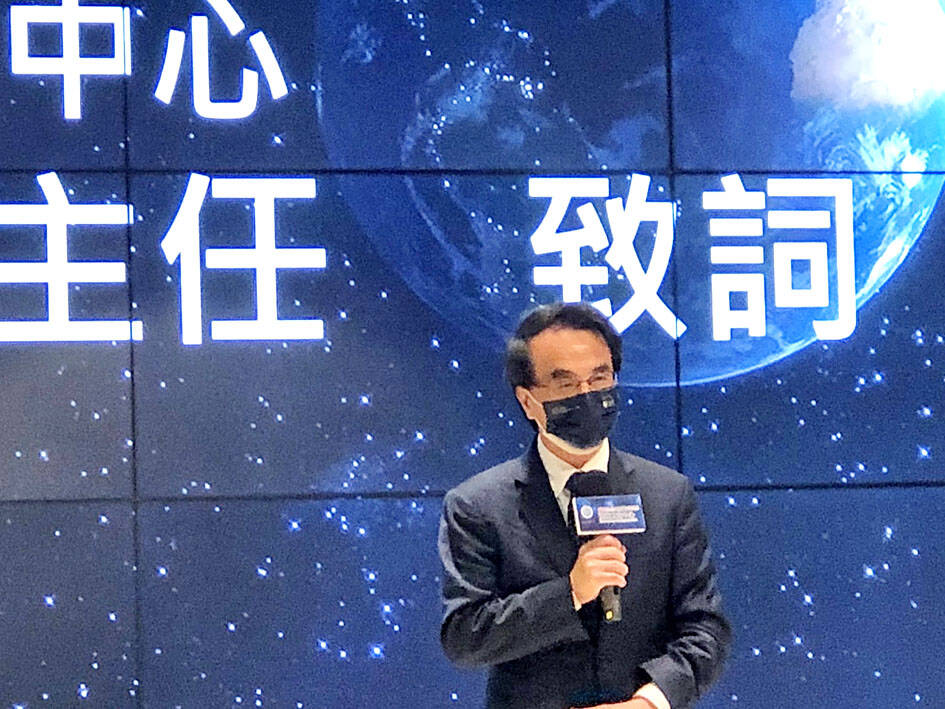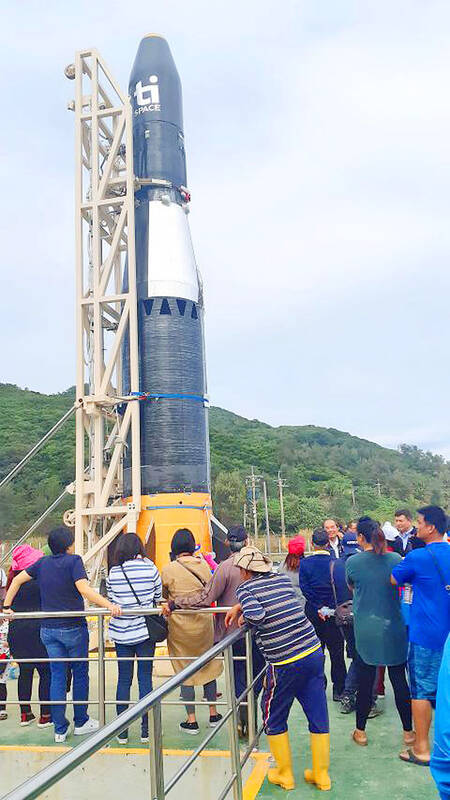Taiwan could launch a domestically built rocket into space as soon as 2026, if the Legislative Yuan approves funding for the Siraya Rocket Plan project, National Space Organization (NSPO) Director-General Wu Jong-shinn (吳宗信) said.
Researchers would next year start work on the project, which was named after the indigenous Siraya people, Wu said on Friday.
If successful, it would be the first rocket to be designed, built and launched entirely in Taiwan — a milestone for the nation’s emerging space industry, he said.

Photo: Yang Yuan-ting, Taipei Times
The NSPO is next year to be reorganized into a legal entity, and renamed the Taiwan Space Agency (TASA), he said, adding that Siraya would be the agency’s first project.
“The project will allow us to test domestically designed and built components for the space industry,” he said.
Under the Space Development Act (太空發展法), the NSPO — and later, TASA — is responsible for construction of a national rocket launch site, he said.

Photo courtesy of Taiwan Innovative Space Inc
The launch site in Syuhai Village (旭海) in Pingtung County’s Mudan Township (牡丹), which the NSPO has used in the past, is suitable for smaller launches, but not for large projects such as Siraya, he said.
A bigger site would be built in either Pingtung County or Taitung County, he said, adding that a selection committee would choose the site based on criteria drafted by the NSPO.
Some of the criteria include transportation options to the site, and whether there are people living within a 2km radius, he said.
“The Siraya rocket project will involve roughly three to four years of planning, which is significantly less time than South Korea’s Nuri rocket took,” he said. “Work started on Nuri in 2010, and it did not launch until October last year.”
Wu said he also expects Siraya to be cheaper than the Nuri project, which cost US$1.7 billion, including the spaceport.

INVESTIGATION: The case is the latest instance of a DPP figure being implicated in an espionage network accused of allegedly leaking information to Chinese intelligence Democratic Progressive Party (DPP) member Ho Jen-chieh (何仁傑) was detained and held incommunicado yesterday on suspicion of spying for China during his tenure as assistant to then-minister of foreign affairs Joseph Wu (吳釗燮). The Taipei District Prosecutors’ Office said Ho was implicated during its investigation into alleged spying activities by former Presidential Office consultant Wu Shang-yu (吳尚雨). Prosecutors said there is reason to believe Ho breached the National Security Act (國家安全法) by leaking classified Ministry of Foreign Affairs information to Chinese intelligence. Following interrogation, prosecutors petitioned the Taipei District Court to detain Ho, citing concerns over potential collusion or tampering of evidence. The

‘FORM OF PROTEST’: The German Institute Taipei said it was ‘shocked’ to see Nazi symbolism used in connection with political aims as it condemned the incident Sung Chien-liang (宋建樑), who led efforts to recall Democratic Progressive Party (DPP) Legislator Lee Kun-cheng (李坤城), was released on bail of NT$80,000 yesterday amid an outcry over a Nazi armband he wore to questioning the night before. Sung arrived at the New Taipei City District Prosecutors’ Office for questioning in a recall petition forgery case on Tuesday night wearing a red armband bearing a swastika, carrying a copy of Adolf Hitler’s Mein Kampf and giving a Nazi salute. Sung left the building at 1:15am without the armband and apparently covering the book with a coat. This is a serious international scandal and Chinese

Seventy percent of middle and elementary schools now conduct English classes entirely in English, the Ministry of Education said, as it encourages schools nationwide to adopt this practice Minister of Education (MOE) Cheng Ying-yao (鄭英耀) is scheduled to present a report on the government’s bilingual education policy to the Legislative Yuan’s Education and Culture Committee today. The report would outline strategies aimed at expanding access to education, reducing regional disparities and improving talent cultivation. Implementation of bilingual education policies has varied across local governments, occasionally drawing public criticism. For example, some schools have required teachers of non-English subjects to pass English proficiency

TRADE: The premier pledged safeguards on ‘Made in Taiwan’ labeling, anti-dumping measures and stricter export controls to strengthen its position in trade talks Products labeled “made in Taiwan” must be genuinely made in Taiwan, Premier Cho Jung-tai (卓榮泰) said yesterday, vowing to enforce strict safeguards against “origin laundering” and initiate anti-dumping investigations to prevent China dumping its products in Taiwan. Cho made the remarks in a discussion session with representatives from industries in Kaohsiung. In response to the US government’s recent announcement of “reciprocal” tariffs on its trading partners, President William Lai (賴清德) and Cho last week began a series of consultations with industry leaders nationwide to gather feedback and address concerns. Taiwanese and US officials held a videoconference on Friday evening to discuss the